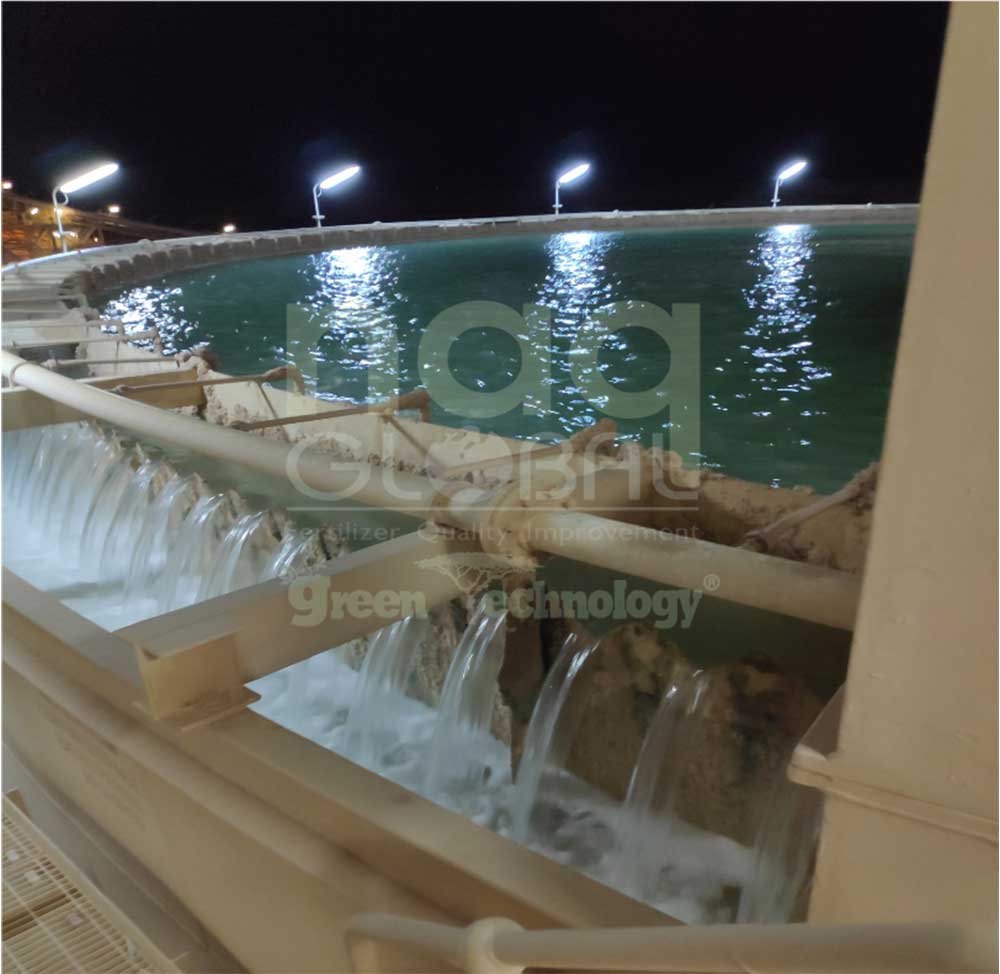Flocculants & Flotation Agents
The most economical process for manufacturing phosphoric acid is a decades-old process that entails treating phosphate rock with sulfuric acid or, more commonly, with mixtures of sulfuric and phosphoric acid to precipitate out calcium sulfate and release phosphoric acid. Flocculants for phosphoric acid production process, also known as the wet process for phosphoric acid, provide one of the most important intermediates for fertilizer production and other phosphate products.
There are various processes used for phosphoric acid Manufacture. Typically, fertilizer production includes a concentration of a filtered dehydrate phosphoric acid (24-28% of P2O5) or semi-hydrate phosphoric acid (35-38% of P2O5) to an acceptable level for further use by several stages of evaporation techniques and combinations thereof, most of which are well known by the people skilled in the art. The resulting phosphoric acid is further concentrated to different acid strengths ranging from 40-42% to 72-76% acid (on a P2O5% basis) during such evaporation processes. However, it is worth noting that the filtered acid often contains many impurities (including inorganic like metal salts and organics like slime) that originate from the mined phosphate rock that is dispersed within the acid liquor to form the phosphoric acid slurry.
The presence of impurities very frequently leads to scale deposit formation on surfaces due to the changes in the impurity's solubility because of temperature changes. Scale formation in pipelines and equipment like heat ex-changer reduces the flow rate and heat transfer, and as a result, the overall evaporation productivity decreases. Therefore, a typical operating cycle for many such phosphoric acid plants is 6-14 days. A cleaning (or maintenance) cycle is usually 1.5-2.5 days, varying in the degree of scale formation, size of scales, and composition of scales.
For built-up scales, NAQ Global provides several excellent methods of descaling a phosphoric acid production system. NAQ Global also has many options for preventive treatment of scaling in phosphoric acid systems, and this method is known as anti-scaling, with the products being called antiscalants. Worldwide, it is well known that the process of phosphoric acid concentration through various stages of evaporation, filtration, etc., is quite energy-consuming; for instance, the consumption of steam in this section of the process can often be as high as 3.5 tons per 1 ton of P2O5.
How Do Flocculants and Filtration Aids Come Into Play?
The higher economic viability of a phosphoric acid concentration process is directly correlated to a growth in productivity based on the efficient, sustainable operation of evaporation and filtration sections of the process. Flocculants and Flotation Agents for P2O5 are chemicals added to systems to enhance the process of flocculation, a process in which particles coagulate and settle at the bottom to give clear liquid on the top. Flocculants and filtration additives are typically used in mining applications and phosphoric acid production plants in the fertilizer industry. NAQ Global offers a wide range of filtration aids, crystal habit modifiers, and flocculants for all fertilizer industry applications. Using NAQ’s process additives for, filtration and flotation agents, it is easy to get:
- Better Water Quality And Clarity
- Environmental Compliance / Clean Water To Discharge
- More Efficient Return Of Water To Mineral Handling And Flotation Process
Apart from the obvious advantages, there are advantages more down the stream that can be obtained using high-quality flocculants. Good flocculants and crystal habit modifiers will avoid filter cloth tears and damage, prevent the P2O5 product from escaping the gypsum, and be easy to handle and apply.
NAQ’s Green Technology-based solutions have all these advantages; moreover, they are very economical because of their high efficiency and high cost-effectiveness. NAQ Global has a wide range of mining products such as Flocculants and Flotation Agents for P2O5, Flocculants for Phosphoric Acid, Flotation Agents, and Flotation Agents for phosphate any more.


